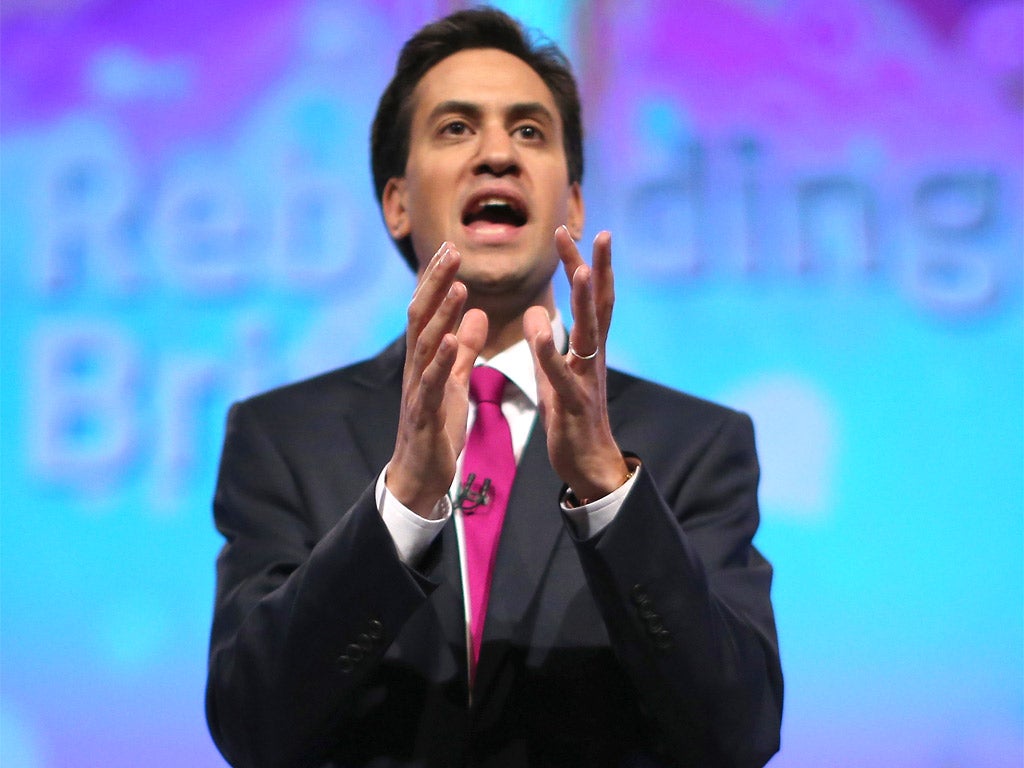Tax rich and tell voters you can spend £20bn, Labour told by think-tank
Fabian Society says manifesto pledge is ‘credible’

A blueprint for a future Labour government to spend at least £20bn a year more than the Conservatives, financed by tax rises for higher earners, is published today.
A commission set up by the Labour-affiliated Fabian Society proposes that Labour may need to cut £5bn off the welfare budget but that raising overall spending by 1 per cent more than inflation from 2016 is “realistic, credible and consistent with deficit reduction”. It recommends a boost to capital projects such as housebuilding.
Last night Labour sources insisted the year-long review was the work of the think-tank, not the party leadership. But its broad approach is understood to reflect Ed Miliband’s thinking. Labour has ruled out a rise in borrowing for day-to-day spending but left the door open to borrowing for investment. At his party’s conference last month, Mr Miliband pledged to double the number of houses built to 200,000 a year by 2020.
If Labour adopts the strategy recommended by the commission, it would open up a clear dividing line between the two main parties at the 2015 election. George Osborne, the Chancellor, has promised to “run a surplus” from 2015-20 to leave room for tax cuts.
The Fabians’ commission on spending choices over the next 20 years concludes: “Spending as a share of national income will probably need to rise a little over this period to avoid harm to the economy or key public services; as will tax revenues if we are also to gradually reduce the national debt.” It says: “We do not support broad-based tax rises when general living standards are still declining but tax increases targeting higher income groups could make a significant contribution. One option would be to examine reform of pension tax relief, where there are potentially large savings that would affect only those on higher incomes.”
Although there is no specific proposal, restricting tax relief on pensions contributions to the 20p basic rate would save an estimated £5.5bn a year. People paying the 40p rate would lose out.
The commission says “tight restraint” will be needed over the next decade and recommends that the growth in spending on pensions and healthcare be curbed to protect “future-oriented” budgets such as skills and capital investment. “Flat” real spending for health, social care, education and economic budgets would require a 3.5 per cent annual cut for all other departments.
If the £5bn cuts in welfare prove necessary, the Fabians suggest ending the “triple lock” under which the basic state pension rises by inflation, earnings or 2.5 per cent, whichever is highest; means-testing winter fuel payments and free TV licences for pensioners; extending recent disability reforms to older people and making some benefits to the disabled taxable. A significant rise in the minimum wage might save £500m of government spending, says the report.
Andrew Harrop, the Fabians’ general secretary, said: “Politicians are never keen to talk about tax but if the choice is between national debt rising even further, falling standards in public services or very gradual rises in taxes, this is a conversation we need to have. While living standards remain under pressure we reject broad-based tax rises, but we think high income groups could pay a little more.”
Lord (John) McFall, the commission’s chairman, and former chairman of the Commons Treasury Select Committee, said: “As the economy recovers, we can and must avoid a further round of savage spending cuts. This will be possible if rising tax revenues are ploughed into public services and if high income groups are asked to pay a little more.”
Labour has pledged to stick within the Coalition’s spending limits for 2015-16 but left its options open after that. Ed Balls, the shadow Chancellor, said last month that Labour would make a decision on capital spending near the election. He wants the Office for Budget Responsibility to audit Labour’s tax and spending plans but the move has been blocked by Mr Osborne.
Tax and spend: Fabians’ blueprint
* A 1 per cent overall rise in public spending from 2016
* “Modest” tax rises for high earners, possibly including cut in tax relief on pension contributions
* £5bn of welfare cuts, including curbs on basic state pension and disability benefits
* £20bn a year of higher spending targeted on building projects and skills
* Significant rise in national minimum wage
Subscribe to Independent Premium to bookmark this article
Want to bookmark your favourite articles and stories to read or reference later? Start your Independent Premium subscription today.

Join our commenting forum
Join thought-provoking conversations, follow other Independent readers and see their replies